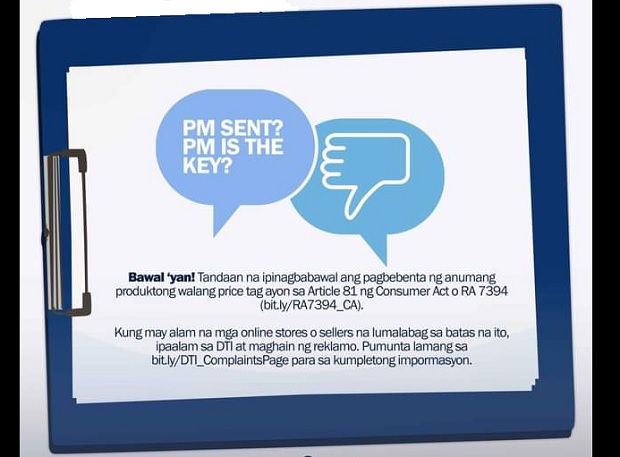In response to the proliferation of prohibited and regulated products sold on marketplace platforms and social media marketplaces, six government agencies have issued a consolidated order to caution online merchants against the sale of unlicensed, restricted, or prohibited products.

The directive is contained in Joint Administrative Order (JAO) No. 22-01 issued by the Department of Trade and Industry (DTI), Department of Health (DOH), Department of Agriculture (DA), Department of Environment and Natural Resources (DENR), Intellectual Property of the Philippines (IPOPHL) and National Privacy Commission (NPC), which consolidates all existing rules and guidelines on online businesses.
The JAO provides a “non-exhaustive” list of at least 50 categories of products that are prohibited or regulated. The JAO seeks to remind all online businesses — whether platforms, e-retailers, or merchants that sell over the Internet – that laws, rules, and regulations that apply to physical stores likewise apply to online stores.
“Laws that apply to brick and mortar stores also apply to online business. A price tag required to be pasted on items you buy in stores are also required to be pasted on the products that you buy online or through published price list. Buyers no longer have to ask for the price from the seller, who will almost always say that a private message is sent (PM me). This is a clear violation of the Price Tag Law,” DTI undersecretary for consumer protection group (CPG) Ruth Castelo said.
In 2021, DTI received over 12,000 complaints against online businesses ranging from deceptive products, to the sale of counterfeit or pirated products, mostly on digital platforms and social media marketplaces.
Under the JAO, all platforms need to verify if the goods sold by their merchants are regulated, prohibited, original, genuine, licensed, or unexpired.
DTI secretary Ramon Lopez said: “All digital platforms including social media marketplaces such as Facebook/Meta, Instagram, Viber, Lazada, Shopee, Carousell, among others, must comply with all existing laws, rules, and regulations. They need to put in place strict protocols to prevent recidivists or those previously found administratively liable from selling again.”
With the accelerated adoption of e-commerce, regulators have seen the proliferation of items that are prohibited for sale without license or permit, among which are fertilizers, chainsaws, medicines, and consumer products under the DTI-Bureau of Philippine Standards (BPS) mandatory list.
Recently, the National Telecommunication Commission (NTC) and DTI met with marketplace platforms and telcos to address the online sale of repeaters, portable cell site equipment signal jammers.
Repeaters are not allowed to be sold without license from the NTC to prevent harmful interference to cellular mobile networks and promote the efficient use of radio frequency spectrum.
“As we encourage consumers to buy online, we must ensure that products sold are safe and of high quality, and that consumers are protected from unscrupulous sellers. We strongly urge the e-commerce marketplace platforms to work with government regulators to establish a mechanism to immediately remove or take down listings of prohibited or regulated products,” Lopez said.
He added, “Under the JAO, government agencies are encouraged to partner with marketplace platforms and use technology to facilitate information transfer using artificial intelligence (AI).”
Under the JAO, food and medicines must comply with FDA registration, while 87 consumer products must contain PS marks or ICC stickers.
Digital platforms are given three days to take down an online post upon notice from the concerned authorized agency, or face charges.
“We have to make sure that consumers have access to quality and safe products. We condemn the sale of fake/counterfeit, substandard or prohibited products online and we will run after violators and merchants who sell unlicensed products including those who do not comply with our statutes,” Lopez said.
The JAO also instructs government agencies to develop a system to exchange intelligence information on prohibited and regulated items monitored online, including automatic sharing of information with the appropriate regulatory agency on possible violations detected or discovered.
This may include the sharing of and access to a database of products or items containing sufficient information, keywords, content, for the purpose.
“Institutionalizing this exchange of information between government agencies is one of the ways by which we can make monitoring of compliance by online sellers more efficient. The DTI e-commerce division shall be tasked to coordinate with both the marketplace platforms and government agencies in setting up this mechanism,” Lopez said.
Online businesses are covered by the Consumer Act of the Philippines, the Philippine Standards Law which provides liabilities in case of defective products, or the Intellectual Property Code for counterfeit and pirated goods. Online sellers need to comply with product and service warranties, labeling requirements including price tag placement.




